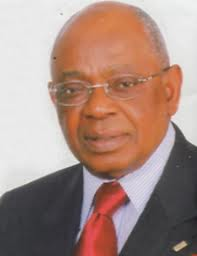Atedo Peterside: Father of Investment Banking in Nigeria

An investment bank, says Wikipedia, is a financial institution that assists individuals, corporations, and governments in raising capital by underwriting and/or acting as the client’s agent in the issuance of securities. An investment bank may also assist companies involved in mergers and acquisitions and provide ancillary services such as market making, trading of derivatives and equity securities, and Fixed Income services. Doing this as a career is investment banking. Unlike commercial and retail banking, investment banking does not involve taking deposits.
Prior to the coming of age of investment banking in Nigeria, there was what was called merchant banking which had been around in Nigeria for long. The difference between merchant banking and investment banking is no more than nomenclature and time, as both are about providing funds and advisory services. Merchant banks, historically, were banks set up to finance traders i.e merchants. The scope would later expand as time went on.
In the eighties to mid-nineties, merchant banks were popular in Nigeria and the scope of their activities were limited to assisting corporations and governments in raising capital and conducting few mergers and acquisition activities. In the early eighties, lawyer-turned-veteran banker, Michael Subomi Balogun floated First City Merchant Bank. The bank, alongside others like NAL Merchant Bank, would later become the leading provider of merchant banking services in Nigeria.
When universal banking policy was implemented by the Central Bank of Nigeria in 2000, the bank obtained universal banking license and rebranded to First City Monument Bank, becoming primarily a commercial bank, although still retaining merchant/investment banking operations. Universal banking license allows a bank to engage in all aspects of banking under a single license.
However, in 1989, one 33-year-old man had come back from the United Kingdom and seen how investment banking is done there. What obtained in Nigeria was still primitive. He saw the fertile opportunity. He set up a company he named Investment Banking and Trust Company (IBTC). That was around the time licenses were issued to new commercial banks set up by equally young Nigerians who had worked in other banks and decided to float their own banks: Zenith Bank (Jim Ovia), Intercontinetal Bank (Erastus Akingbola), Guaranty Trust Bank (Fola Adeola), Commerce Bank (Femi Adekanye) etc. Atedo decided to be different. He looked the way of investment banking.
With his small office in Marina (then the corporate capital of Nigeria – before attention shifted to VI), Atedo assembled a couple of other young professionals and started what would later become the leading investment banking institution in Nigeria. With integrity and professionalism as watchwords, the company grew to become the reference point in modern investment banking in Nigeria by the end of 20th century. It undertook landmark merger and acquisition activities and corporations and governments scrambled to use it in their capital raising and restructuring exercises.
In 2003, the company was listed on the Nigerian Stock Exchange, and Chukwuma Soludo’s consolidation policy saw it merge with Chartered Bank, a commercial bank. The enlarged IBTC-Chartered Bank was later acquired by Standard Bank of South Africa, and rebranded StanbicIBTC. Peterside quit when the ovation was loudest, but not before establishing himself as the man that revolutionized investment banking in Nigeria.
The Rivers state-born Peterside attended Kings College, Lagos, before proceeding to The City University, London, to study economics. His second degree, also in economics, was obtained from the London School of Economics and Political Science. He is also known as a stickler for corporate governance ethics. Indeed, he headed the committee set up by President Olusegun Obasanjo to draw the Code of Best Practices for Public Companies in Nigeria in 2003.
While Subomi Balogun is the father of merchant banking in Nigeria and grandfather of investment banking, Atedo Nosa Atowari Peterside redefined it. He is undisputably the father of investment banking in Nigeria.
Established in March 2013, JarusHub is a Nigerian information hub with focus on career and management. It is rated Nigeria's most authoritative destination for online career resources. It parades an array of Nigerian professionals who share their career experiences with a view to bridging career information gap and mentoring a generation to success. Whether you're a student, a recent graduate or an established professional, or even an executive, you will always find something to learn on JarusHub. All enquiries to jarushub@gmail.com or 0808 540 4500. Facebook: www.facebook.com/jarushub; Twitter: @jarushub or @mcjarus.
Path to Big 4: Stream 11
April 4, 20245 Best Useful Applications Of AI in Modern World
November 17, 2023Career Q&A with Jarus: Oil & gas career, poor CGPA
September 17, 2023
3 comments
Let us have your say by leaving a comment belowCancel reply
Recommended For You
-
HOW MBA CAN AID YOUR CAREER SWITCH
February 26, 2016 -
FINAL YEAR STUDENTS: HOW TO NETWORK LIKE A PRO
July 10, 2015










Father of investment banking indeed and also a role model to most of us bankers.
[…] Atedo Peterside: Father of Investment Banking in Nigeria […]
[…] Investment Banking. For those interested in that, I once did an article where I proclaimed him the father of investment banking in Nigeria. Let’s return to the subject: what I learned from Atedo […]